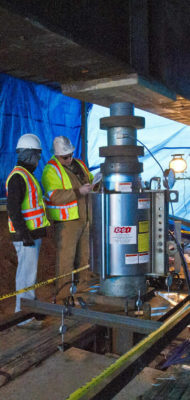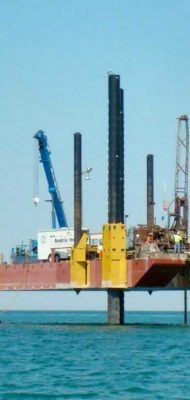Professional Materials Test Lab for Industry-Leading Top Quality Specifications
Wiki Article
Comprehensive Materials Screening Providers for High Quality Guarantee
In today's affordable market, ensuring the top quality and integrity of materials is essential for the success of any kind of job or product. Detailed materials screening solutions play a pivotal duty in accomplishing this purpose. These solutions encompass an array of examinations and analyses that evaluate the toughness, toughness, chemical structure, and efficiency of materials. materials test lab. By employing non-destructive testing approaches and performing environmental and weathering examinations, prospective weaknesses or vulnerabilities can be recognized and dealt with proactively. Material failure evaluation enables for a much deeper understanding of why materials may not fulfill the wanted standards, leading to boosted high quality control measures. With a professional and thorough strategy, comprehensive materials testing services give invaluable support to sectors throughout numerous industries, guaranteeing the stability and quality control of frameworks, products, and items.Toughness and Sturdiness Examining
Toughness and durability screening is a vital step in guaranteeing the quality and dependability of materials, as it permits the examination of their ability to endure exterior forces and environmental problems. This sort of screening is vital in various markets, consisting of building, automotive, aerospace, and manufacturing.Throughout strength screening, materials are subjected to various types of forces, such as stress, compression, shear, and bending, to establish their mechanical residential or commercial properties and resistance to deformation. This helps producers recognize exactly how products will do under real-world conditions and make notified choices about their suitability for certain applications. By gauging parameters like return toughness, utmost tensile strength, and modulus of elasticity, designers can examine the product's efficiency and ensure it fulfills the required standards.

Chemical and Make-up Evaluation
Chemical and composition analysis is an important aspect of products testing, continuing the analysis from the previous subtopic by examining the important make-up and molecular structure of products. This evaluation offers useful understandings right into the chemical properties and make-up of a product, which is essential for comprehending its habits and efficiency in various applications.One important aspect of chemical and make-up evaluation is the identification and quantification of elements present in a product. This details helps establish the important make-up and pureness of the product, ensuring it satisfies the needed standards and specifications. Additionally, it enables the discovery of contaminations or trace aspects that may influence the product's properties or efficiency.
Additionally, chemical and make-up analysis can offer information regarding the molecular framework of a material. This includes the setup and bonding of atoms, which influences the material's physical and chemical homes. By comprehending the molecular framework, scientists and engineers can make educated choices concerning the suitability of the product for particular applications and identify any type of prospective weaknesses or vulnerabilities.
Non-Destructive Evaluating Methods

Environmental and Wear And Tear Screening
Environmental and weathering screening plays a critical function in evaluating the longevity and performance of materials in different conditions. materials test lab. This kind of testing is essential in establishing exactly how products will endure exposure to various environmental aspects, such as temperature level, humidity, UV radiation, and chemicals. By subjecting materials to these conditions in a regulated laboratory setup, makers can get valuable insights right into their long-lasting performance and make notified decisions about their suitability for certain applicationsAmong the crucial advantages of ecological and weathering screening is that it permits manufacturers to analyze the effect of these factors on the physical, mechanical, and chemical residential properties of products. As an example, exposure to heats can trigger products to increase or contract, causing dimensional changes and potential failure. Similarly, extended exposure to UV radiation can cause materials to deteriorate and lose their structural his comment is here stability. By replicating these problems busy, makers can determine potential weak points and make essential renovations to make certain the long life and dependability of their products.

In addition to reviewing the resilience of products, ecological and weathering screening additionally helps suppliers abide by industry criteria and laws. Numerous industries, such as automobile, aerospace, and building and construction, have details requirements for products used in their items. By conducting screening in accordance with these standards, producers can show the high quality and reliability of their products, giving clients confidence in their items.
Material Failing Evaluation
The evaluation of material failing is an important component of thorough products evaluating services for quality control. Product failing can take place because of numerous factors such as design flaws, making defects, incorrect usage or maintenance, and environmental conditions. The function of product failing evaluation is to identify the origin of the failing and supply insights for enhancing the material's efficiency and longevity.Product failure evaluation includes a systematic method that consists of visual assessment, non-destructive screening, and lab screening. Aesthetic examination enables the identification of noticeable signs of failing More Help such as fractures, deformations, or cracks. Non-destructive screening techniques, such as ultrasonic screening or X-ray examination, can be utilized to detect inner imperfections without causing further damage to the material. Laboratory screening entails conducting different tests, such as mechanical testing, chemical evaluation, and microstructural evaluation, to understand the product's attributes and homes.
By examining material failures, manufacturers can determine powerlessness in their products and make needed enhancements to stop future failings. This aids in ensuring the top quality and integrity of the products made use of in numerous markets such as vehicle, aerospace, building and construction, and look what i found electronics. Additionally, product failing analysis plays an important duty in product growth and quality assurance, as it assists in selecting the best materials and enhancing their performance.
Final Thought
To conclude, comprehensive products checking services are essential for quality control. These services consist of toughness and resilience chemical, composition and screening analysis, non-destructive screening approaches, ecological and weathering testing, and material failure analysis. By using these testing techniques, companies can make sure the high quality and reliability of their products, resulting in boosted product efficiency and consumer complete satisfaction.Material failure evaluation allows for a much deeper understanding of why materials might not meet the preferred standards, leading to enhanced high quality control measures. With a thorough and specialist approach, thorough products screening solutions supply indispensable support to sectors throughout numerous fields, guaranteeing the stability and quality assurance of frameworks, items, and materials.
The analysis of product failure is an important part of detailed materials checking solutions for top quality assurance. The purpose of product failing evaluation is to recognize the root cause of the failure and give understandings for improving the product's efficiency and toughness.
In addition, product failing analysis plays an essential function in item growth and high quality control, as it aids in choosing the best materials and maximizing their performance.
Report this wiki page